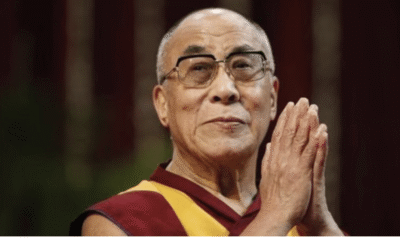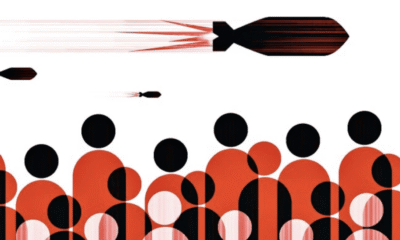
|
Getting your Trinity Audio player ready...
|
(The article was originally published in Indian Express on June 01, 2024 as a part of Dr Madhav’s column titled ‘Ram Rajya’. Views expressed are personal.)
AT A CONFERENCE in the European Parliament earlier this week, I noticed an interesting trend among some European political thinkers. There is palpable worry and deep distress that the world is moving inexorably towards another Cold War. In fact, some even believe that the Third World War is not too far off. One Member of the European Parliament (MEP) whispered into my ear that some rich Europeans are actually relocating to places considered remote but more secure, like Cambodia and Papua New Guinea, buying villas and mansions there.
Sitting in India, we may think that the Europeans are being paranoid. Not necessarily. Europe has seen two world wars and an intensely fought Cold War in the last century. Memories of the horrors of big power competition and conflict are still fresh in their minds. There are many similarities between what happened then and what is happening now. Several smaller conflicts culminated in World War I. Similarly, important strategic blunders by Germany and Japan, like the attacks on Pearl Harbour and Poland, resulted in the escalation of the war in Europe into World War II. Then came the Cold War between the US and the Soviet Union, the ill effects of which were endured not only by Europeans but the entire world. There were dozens of occasions during those four fateful decades when the world was on the brink of total destruction. The Pentagon acknowledged some years ago that on 15 occasions, the world came dangerously close to a nuclear armageddon. We survived, but not without paying a heavy price.
A new Cold War-like situation is again brewing between the new set of rivals — the United States and the People’s Republic of China. With countries like Russia, Iran and China on one side and NATO and Israel on the other, it is now threatening to escalate into a real global war — World War III.
The leaders of the two superpowers — the US and China — strongly reject the portrayal of the current competition between them as a new Cold War. President Joe Biden insisted a couple of years ago that he doesn’t “want to contain China”. “We are all better off if China does well,” he said. After the meeting with his US counterpart in San Francisco last November, President Xi Jinping, on his part, proclaimed that “China doesn’t want a cold war or a hot war with anyone”.
These sentiments are reassuring. But the situation on the ground is not. Virtually every continent has become a battlefield for big power competition today. From Africa to Latin America, there is a growing competition for securing the reserves of critical minerals. Across Asia, there is a race to win friends and build military and economic partnerships. In Europe and in the Middle East, in Ukraine and in Gaza, it is already an open war.
The mounting losses of Ukrainian forces in the war with Russia and the rising death toll of civilians on one side and Israeli soldiers on the other in Gaza are ominous signs. A Russian minister accused NATO of planning to use tactical nukes on their assets. If that happens, the consequences would be disastrous. On the other hand, the situation in Gaza is causing turmoil across Europe and the US. Not a day passes without massive demonstrations in support of Palestine and Gaza. Europeans are worried that a call to arms by forces supporting the Palestinian cause could lead to mayhem in their countries, giving rise to a civil war-like situation in city after city, from Stockholm to London, and from Paris to Brussels.
Tensions are mounting in the Indo-Pacific too. In a statement last week, the new president of Taiwan, Lai Ching Te, said that as per the country’s constitution “the Republic of China and the People’s Republic of China are not subordinate to each other”. This has ruffled feathers in Beijing. The Taiwan Affairs Office of the Chinese government immediately labelled Lai a “dangerous separatist” and described his speech as a “downright confession of Taiwan independence”. “We must counterattack and punish the DPP authorities for colluding with external forces to pursue ‘independence’ provocations,” the Chinese spokesperson threatened.
Severely jolted by the horrors of World War II, which killed close to 75 million people, world leaders decided to build an institutional framework for promoting global peace in the form of the United Nations and its allied bodies. However, those institutions remained ineffective when the world slipped into a Cold War just a couple of years after their creation. Their failure and near collapse are much more evident today. They are seen as either overtly partisan or ineffective.
These raging wars and rising tensions in different parts of the world, from the Middle East to Europe to the Western Pacific, call for urgent attention because the world cannot afford another Cold War, much less a world war. This should occupy a place of priority for strategists in Modi 3.0 in India too. Hitherto, they took the line that India stands for “peace”. Unfortunately, international law doesn’t recognise such a status for countries. There are “neutral powers”, like Switzerland and Norway, and India’s stand too has been that of neutrality until now. This allows India, together with other important powers in the Global South, to step in to find a way to de-escalate the situation.
There was a time during the Cold War when India played an active role in the Non-Aligned Movement. But that was the non-alignment of the weak. Today’s India is strong and respected. It has the audacity to pursue “strategic autonomy” from a position of strength, not yielding before any big power. In the process, it has raised hopes in several quarters. Would Modi 3.0 like to step into the big shoes?




